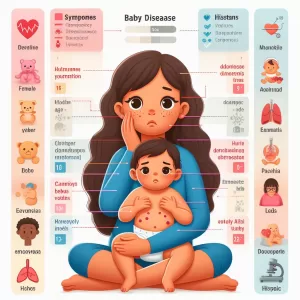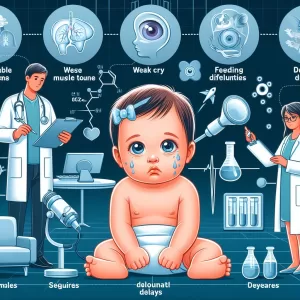Congenital syphilis, a disease transmitted from mother to child during pregnancy, represents a major public health challenge with profound implications. Despite medical advances, this infection continues to affect thousands of families around the world, endangering the health and development of newborns.
This article explores congenital syphilis in depth, highlighting the mechanisms of transmission and associated risks, the symptoms and complications it can cause, and essential diagnostic and treatment strategies. We also highlight the crucial importance of prenatal screening in the prevention of this disease and examine its long-term consequences, both on the physical, mental, and emotional health of affected individuals. By better understanding these aspects, we can all play a role in the fight against congenital syphilis and in protecting the health of future generations.
I. Transmission and Risks:

Syphilis is a sexually transmitted infection (STI) caused by the bacteria Treponema pallidum. It is particularly known for its significant impact on public health around the world. Transmission of this infection from mother to baby during pregnancy or delivery is a major concern, as it can have serious consequences on the health of the newborn. This form of transmission is called congenital syphilis.
1. Transmission Process:
Congenital syphilis occurs when the bacteria Treponema pallidum, which causes syphilis, crosses the placenta from the infected mother to the fetus. This transmission can occur at any stage of pregnancy and even during childbirth if the child comes into contact with active syphilitic lesions. It is crucial to note that the risk of passing syphilis from mother to baby is highest when she is in the early stages of the disease, where the bacterial load is greatest.
2. Risks and Consequences:
Congenital syphilis can cause a series of serious complications for the fetus, including:
– Stillbirths: the death of the fetus in utero after 20 weeks of pregnancy.
– Infant deaths: can occur shortly after birth due to serious complications.
– Congenital anomalies: problems with bone development, neurological problems, or malformations.
– Intrauterine growth retardation and low birth weight.
– Early symptoms in newborns, such as rash, fever, swelling of the liver and spleen, anemia, and jaundice.
3. Statistics and Upsurge:
Recent years have seen a worrying increase in cases of congenital syphilis, particularly in the United States. In 2023, more than 3700 cases have been reported, with at least 150 cases resulting in stillbirths or infant deaths. This resurgence highlights the importance of early detection and treatment of syphilis in pregnant women to prevent transmission of the disease to the fetus.
4. Importance of Screening and Treatment:
Syphilis screening is a crucial element of prenatal care. It makes it possible to identify infected women to administer appropriate antibiotic treatment, generally based on penicillin, to eliminate the infection and reduce the risk of transmission to the baby. Regular follow-up is also essential to ensure that the treatment is effective.
The transmission of syphilis from mother to baby is a serious problem, with potentially devastating consequences for the health of the newborn. Prevention through early detection and effective treatment is the key to combating the spread of congenital syphilis and protecting the health of future generations.
II. Symptoms and Complications:

Congenital syphilis is an alarming condition due to the diversity and severity of its manifestations. The ability of this disease to mimic other conditions and remain undetected at birth makes its early diagnosis and treatment crucial. Let’s take a detailed look at the symptoms and complications associated with congenital syphilis to better understand the challenges of its prevention and management.
1. Early Symptoms:
Early symptoms of congenital syphilis usually appear within the first weeks or months of life. They may include, but are not limited to:
– Rashes: May appear on any part of the body, often on the palms of the hands and soles of the feet. These rashes may be bullous and contain fluid.
– Bone problems: Pain or difficulty moving limbs due to inflammation of bones or joints.
– Hepatosplenomegaly: Swelling of the liver and spleen, often accompanied by jaundice (yellowing of the skin and eyes).
– Rhinitis: Bloody or purulent nasal discharge, known as “syphilitic rhinitis.”
– Anemia and low birth weight.
2. Long-Term Complications:
If congenital syphilis is left untreated, children can develop serious complications, often years after birth, such as:
– Dental problems: Hutchinson teeth, characterized by barrel-shaped incisors and blackberry-shaped molars.
– Bone deformities: Anomalies such as saber tibia, and abnormal curvature of the shins.
– Vision and hearing problems: Congenital syphilis can cause blindness and deafness.
– Learning difficulties and developmental delay due to neurological damage.
3. Growth Retardation and Premature Birth:
Congenital syphilis can interfere with normal fetal development, leading to intrauterine growth restriction. This delay can result in premature birth, which in turn increases the risk of neonatal complications and infant mortality.
4. Stillbirth:
Stillbirth is one of the most tragic consequences of congenital syphilis, where infection leads to the death of the fetus before birth. Prevention through screening and treatment of maternal syphilis is crucial to reduce this risk.
5. Importance of Screening and Treatment:
Routine screening of all pregnant women for syphilis is essential to detect and treat the infection early, thereby protecting the baby’s health. Effective treatment of syphilis during pregnancy with penicillin can prevent transmission to the fetus in most cases.
Congenital syphilis illustrates the critical importance of universal access to quality prenatal care and STI testing for pregnant women. Raising awareness of this disease and its potential consequences is essential to encourage pregnant women to seek screening and treatment if necessary. By acting proactively, it is possible to significantly reduce the risks associated with congenital syphilis and protect the health and well-being of future generations.
III. Diagnosis and Treatment:

Diagnosis and treatment of syphilis, both in mothers and newborns, play a crucial role in preventing the serious consequences and long-term complications of this bacterial infection. Let’s discuss these aspects in more detail, emphasizing the importance of early detection and effective treatment.
1. Diagnosis of Syphilis in Newborns:
The diagnosis of congenital syphilis in newborns is mainly based on serological tests, which look for the presence of antibodies against Treponema pallidum in the baby’s blood. Two main types of tests are used:
-Non-treponemal tests (VDRL, RPR): These tests detect antibodies produced in response to cellular injury caused by syphilis. Although they are useful for screening, they can sometimes give false positive results due to other medical conditions.
-Treponemal tests (FTA-ABS, TP-PA): These tests detect antibodies directed specifically against Treponema pallidum, the causative agent of syphilis. They are used to confirm the diagnosis after a positive nontreponemal test.
In some cases, other tests may be necessary, such as spinal fluid tests, x-rays to detect bone abnormalities, or vision and hearing tests to assess the extent of complications potential.
2. Treatment of Syphilis in Newborns:
The treatment of choice for congenital syphilis is penicillin, an antibiotic effective against Treponema pallidum. Treatment is aimed at eliminating bacterial infection in the newborn and preventing the development of long-term complications. Penicillin is administered intravenously or intramuscularly, depending on the stage and severity of the infection.
3. Screening during Pregnancy:
Screening for syphilis during pregnancy is essential to detect infection in the mother and enable early treatment, thereby reducing the risk of transmission to the fetus. Current guidelines recommend routine screening of all pregnant women for syphilis during the first trimester of pregnancy, or earlier if possible. Second screening in the third trimester and at the time of delivery may be recommended in areas of high prevalence or for women at high risk.
Early treatment of syphilis during pregnancy with penicillin can prevent mother-to-child transmission in most cases. In cases of penicillin allergy, desensitization is often carried out to allow treatment with this antibiotic, as there is no equally effective alternative for the treatment of congenital syphilis.
Effective management of congenital syphilis requires a a coordinated approach that includes routine screening during pregnancy, accurate diagnosis of the newborn, and prompt and appropriate treatment. Raising awareness of the importance of screening for syphilis and the availability of treatment can help significantly reduce the incidence of this disease and its serious complications. By adopting these measures, it is possible to protect the health of newborns and contribute to the eradication of congenital syphilis.
IV. The importance of Prenatal Screening:

The importance of prenatal screening to prevent congenital syphilis cannot be overstated. By integrating syphilis screening into standard prenatal care, it is possible to effectively detect and treat this infection in pregnant women, thereby protecting the health of their babies. This process plays a crucial role in reducing the risks associated with this serious infectious disease.
1. Why is Prenatal Screening Essential?
-Reduction of Mother-Child Transmission: Prenatal screening makes it possible to identify pregnant women infected with syphilis and treat them before the bacteria can be transmitted to the fetus. This is crucial because mother-to-child transmission of syphilis can lead to devastating consequences, including premature births, stillbirths, and babies born with severe infections.
-Prevention of Serious Complications: By detecting and treating syphilis early in pregnant women, prenatal screening helps prevent serious complications in newborns, such as physical abnormalities, developmental delays, and neurological problems.
-Improved Pregnancy Outcomes: Treatment of syphilis during pregnancy significantly improves health outcomes for mother and baby. It reduces the risk of obstetric complications and ensures a safer pregnancy outcome.
-Awareness and Education: Prenatal screening also provides an opportunity for health professionals to educate pregnant women about the risks of syphilis and other sexually transmitted infections (STIs). This awareness can encourage safer sexual behavior and better reproductive health care.
2. How is Prenatal Screening Carried Out?
Prenatal screening for syphilis is usually done through blood tests during the first prenatal visit. According to public health guidelines, a second screening may be recommended during the third trimester for high-risk populations or in areas of high syphilis prevalence.
Integrating syphilis screening into regular prenatal care is an essential strategy to protect the health of mothers and their babies. By ensuring that all pregnant women receive appropriate screening and treatment for syphilis, it is possible to significantly reduce the incidence of congenital syphilis and improve pregnancy outcomes. Increased awareness, universal testing, and access to treatment are the keys to eliminating this serious infectious disease as a public health problem.
V. Long-Term Consequences on Mental and Emotional Health:

The long-term consequences of congenital syphilis extend far beyond physical symptoms and complications, also impacting the mental and emotional health of affected individuals. The importance of addressing these dimensions of illness is crucial to the overall development and well-being of the child.
1. Impacts on Mental and Emotional Health:
-Self-esteem: Children with congenital syphilis may experience developmental delays, physical disabilities, or visible abnormalities, which can negatively affect their self-image. This can lead to low self-esteem, anxiety, and depression, particularly as they become aware of how different they are from their peers.
-Social Interactions: Physical or neurological difficulties may hinder the child’s ability to fully participate in social or academic activities, thereby limiting their opportunities to interact with others. This can lead to social isolation, communication difficulties, and relationship problems.
-School achievement: Cognitive and neurological deficits associated with congenital syphilis can affect academic performance, making it more difficult for children to reach their full educational potential. This can lead to frustrations and a feeling of failure which impacts their motivation and future ambition.
2. Psychological and Educational Support:
To mitigate these impacts, multidisciplinary support is necessary:
-Early Interventions: Early intervention programs aimed at supporting cognitive, language, and social development can help children reach their developmental milestones and improve their quality of life.
-Psychological support: Individual or family therapy can be beneficial in managing emotional and behavioral problems. Therapists can help children build their self-esteem and develop healthy coping strategies.
-Individualized Education Plans (IEPs): Schools must provide specific accommodations and supports to meet the educational needs of affected children. This may include specialized support services, such as occupational therapy, physiotherapy, or adapted academic support.
-Support for families: Informing and supporting families on how to manage the long-term complications of congenital syphilis is essential. This may include advice on navigating the health care and educational systems, as well as emotional support for parents and caregivers.
Recognizing and addressing the mental and emotional health consequences of congenital syphilis are fundamental to the holistic treatment of this condition. By providing appropriate psychological and educational support, it is possible to significantly improve the quality of life of affected children and offer them better prospects. Collaboration between health professionals, educators, and families is essential to create a supportive environment that meets the complex needs of these children.
VI. Long-Term Consequences on Physical Health:

The long-term physical health consequences of newborns with congenital syphilis as they reach adulthood are a topic of critical importance that deserves careful attention. Congenital syphilis, if not diagnosed and treated in time, can lead to a variety of long-lasting physical complications that affect the quality of life of affected individuals. These impacts can be diverse and affect several body systems.
1. Neurological Problems:
Congenital syphilis can cause persistent neurological problems, such as paralysis, difficulty with motor coordination, and sensory problems such as hearing loss. These conditions can limit the individual’s functional abilities, influencing their daily life and their ability to work or carry out normal activities.
2. Dental Alterations:
Hutchinson’s teeth, a hallmark of congenital syphilis, can affect dental appearance and function, leading to self-esteem problems and eating difficulties. Corrective dental care may be necessary, but it may not completely resolve cosmetic or functional deficits.
3. Bone and Musculoskeletal Problems:
Abnormalities in bone structure, such as saber tibia, can persist into adulthood, causing chronic pain, mobility difficulties, and potentially, physical limitations. These conditions may require continued medical monitoring and orthopedic interventions.
4. Visual Problems:
Untreated congenital syphilis can cause long-term vision problems, ranging from moderate vision loss to blindness. This can have a significant impact on personal and professional development, requiring specific adaptations for education and employment.
5. Cardiovascular Problems:
In some cases, congenital syphilis can affect the cardiovascular system, leading to abnormalities such as syphilitic aortitis, which can cause serious complications in adulthood, such as aortic insufficiency or aneurysms.
6. Impacts on Reproductive Health:
Women with congenital syphilis may experience complications during pregnancy, including an increased risk of passing the infection to their child. Medical monitoring and preventive treatments are essential for these women.
7. Prevention and Treatment:
Prevention of these long-term consequences relies on early diagnosis and treatment of syphilis in pregnant women and newborns. Regular medical monitoring is crucial to identify and manage potential complications as soon as they appear. Multidisciplinary interventions, including specialized medical care, rehabilitation therapies, and psychosocial support, can help alleviate some of the impacts of these complications.
The consequences of congenital syphilis on physical health in adulthood highlight the importance of early detection and treatment. By investing in public health programs focused on prenatal screening and treatment for syphilis, it is possible to significantly reduce the incidence of long-term complications in adults previously affected by this condition. Raising awareness of these consequences can also encourage proactive care and appropriate medical monitoring for those who have been exposed to congenital syphilis.
Conclusion:
The fight against congenital syphilis requires a comprehensive approach that goes beyond medical treatment of symptoms. It requires sustained attention to prenatal screening programs, education of future parents on risks and transmission routes, as well as psychological and educational support for affected children and families.
The long-term consequences of congenital syphilis on physical, mental, and emotional health highlight the urgency of action to prevent this disease and to ensure monitoring and ongoing support for those affected. By joining forces, raising awareness, and ensuring access to prenatal care and treatment, we can help reduce the impact of this condition and provide a healthier future for children around the world.

